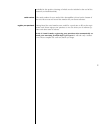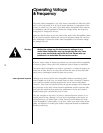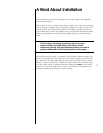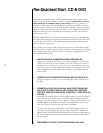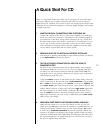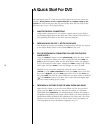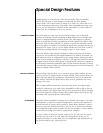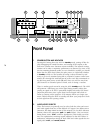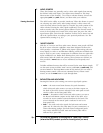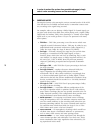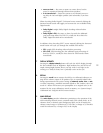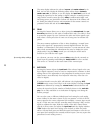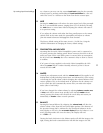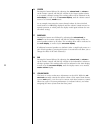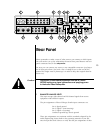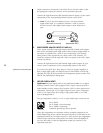
17
3 AUDIO SOURCES
These four buttons are generally used to select audio signals from among
the defined audio-only inputs. (See define source buttons in The Setup
Menu section of this manual.) To use these selection buttons, choose the
appropriate path (see path, below), and then make your selection.
Viewing Simulcasts The AVP2 has the ability to provide “simulcasts.” When this feature is turned
on, selecting any audio source after having selected a video source will
cause the newly-selected audio signal to “override” the audio portion of the
video selection (leaving the video signal unaffected). Thus, to enjoy a si-
mulcast, merely select the desired picture followed by the desired sound. To
revert to the regularly-used sound of the video input, just press the video
input button again. (Note that this “simulcast” feature can be turned on and
off in the Operate Menu, according to your personal preference. See The
Operate Menu, starting on p. 38.)
4 “MORE” SOURCES
With five A/V sources and four audio source buttons, most people will find
the AVP’s source selection capabilities more than adequate. However, the
AVP2 provides a maximum of fifteen audio inputs (eight analog pairs and
seven digital), in order to accommodate differing connection standards that
may be used on your source components. In addition, there are eight video
inputs available for use. Rather than allowing these extra connectors to re-
main unused after the initial nine primary source buttons are defined, we
have provided a
more button to access additional, less frequently-used
sources.
To define additional sources that will be accessed by the more button, simply
use the menu system to define “more” sources: either a/v or audio-only. (See
set more buttons in The Setup Menu section of this manual.) You can teach a
learning remote control a direct-access command for any of these “extra”
sources, or use the more button to cycle through them.
5 PATH BUTTON AND INDICATORS
Pressing this button cycles among your various signal path options:
• main — the main room/home theater; this path determines
which video and audio sources are sent to the Main outputs on
the back of the AVP2. Sources selected for the main path are indi-
cated in yellow on the front panel LEDs.
• remote — determines which video and audio sources are sent to
the Record and Remote outputs on the back of the AVP2, to be
recorded or sent to another system elsewhere in the house. The
source selected on the remote path is indicated in red on its
front panel LED.
• both — the audio and video signals for both main and remote
paths may be selected at the same time, for your convenience; as
when entertaining, perhaps, for whole-house background music.
Any source selected for “both” main and remote paths will be
indicated by a green LED.
Tip: To avoid any possibility of running into a “Tape Loop” conflict
(where the AVP2 prevents you from choosing what you want,



